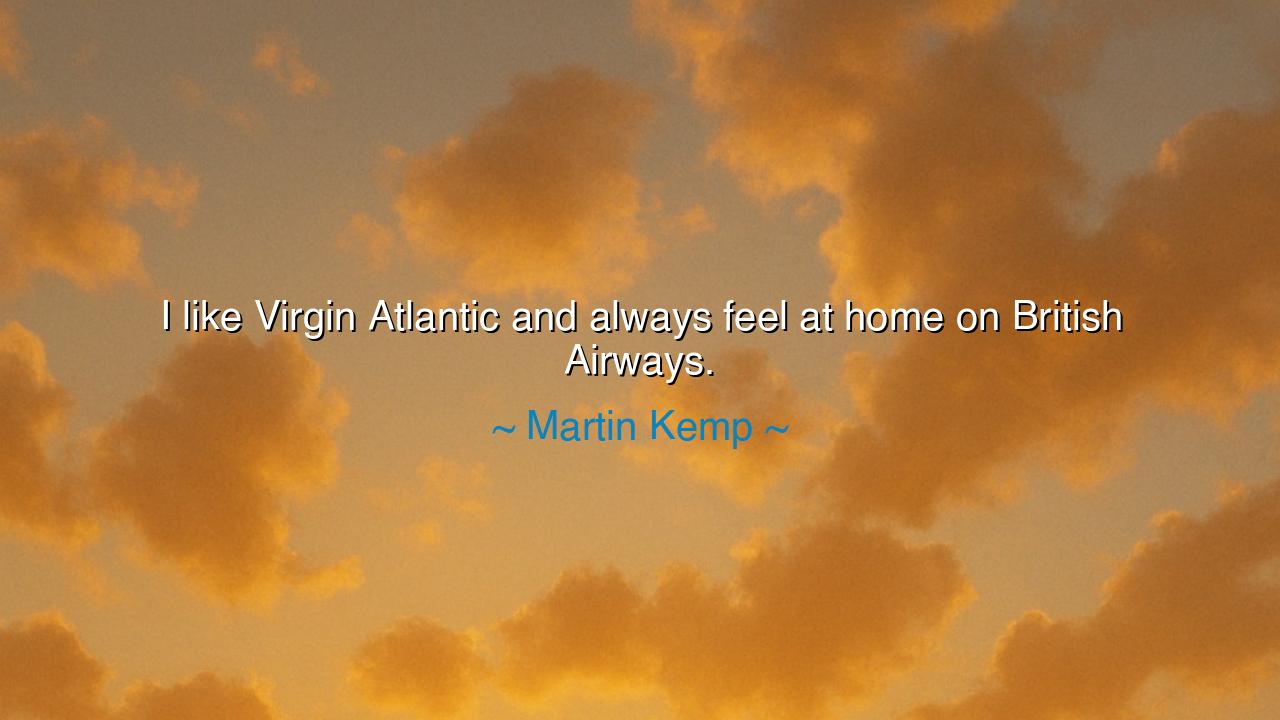
I like Virgin Atlantic and always feel at home on British






“I like Virgin Atlantic and always feel at home on British Airways.” Thus spoke Martin Kemp, the musician and actor whose words, though simple in sound, carry the quiet warmth of belonging and the deeper truth of what it means to find comfort amid motion. At first glance, his quote seems a mere remark about travel — a passing nod to two great airlines. But beneath its ease lies the voice of one who has wandered far and learned that home is not always a place, but a feeling — a harmony between memory, identity, and peace. For Kemp’s words speak of a truth as old as the human heart: that wherever we roam, what we truly seek is not luxury or novelty, but the echo of the familiar — that sense of being known and safe, even among the clouds.
In his affection for Virgin Atlantic, there is a spirit of adventure — the joy of discovery, the thrill of modernity, the excitement of journeys yet untaken. Virgin, with its bold colors and forward energy, represents the fearless side of the traveler, the part that delights in breaking boundaries and seeing the world anew. It is the curiosity of the human soul, the same fire that drove the explorers of ancient times — Magellan, who sailed beyond the known horizon; Marco Polo, who crossed deserts to glimpse unseen kingdoms. Kemp’s liking for Virgin Atlantic is the modern echo of that same adventurous impulse — the will to step beyond comfort and touch the unknown with courage and wonder.
Yet when he says he “feels at home on British Airways,” the tone softens, becomes tender. For while adventure nourishes the spirit, home restores it. The British flag upon the wing, the accent of the crew, the rhythm of the language — these things, though small, speak to the heart of belonging. In those details, Kemp finds not simply a service, but a sanctuary — the calm reminder of who he is and where he comes from. This duality — of exploration and return — has shaped the destiny of humankind since the dawn of history. We voyage out to learn the world, but we always long to come back to where our spirit feels known.
The ancients understood this cycle well. Consider Odysseus, who after ten long years of war and ten more of wandering, longed not for gold or glory, but for the shores of Ithaca, where his wife, his son, and his olive tree awaited him. Though he had seen the marvels of the world — islands of enchantment, seas of peril — his heart yearned for the quiet simplicity of home. So too does Martin Kemp, in his own way, express this timeless truth. The gleaming cabin of British Airways becomes his modern Ithaca — the place where he is not a performer or a public figure, but simply himself.
There is also a deeper wisdom here: that to “feel at home” is one of the greatest blessings life can offer. In an age of constant motion — of airports, screens, and restless ambition — many wander endlessly, yet never feel settled within. Kemp’s statement reminds us that home is not merely geography, but the meeting place of memory and peace. To feel “at home” is to find alignment between inner and outer worlds — to be at ease with oneself, wherever one stands. Whether in the skies above nations or the quiet streets of one’s childhood, home is the state where one’s heart no longer searches, but rests.
Let us also not overlook the gratitude within Kemp’s tone. He does not speak with entitlement, but with appreciation — with the joy of one who recognizes comfort as a gift, not a right. In this way, his words offer a lesson in contentment: that happiness is often found not in the extraordinary, but in the familiar. The warmth of a smile, the tone of a greeting, the small kindnesses that make the world less vast — these are the things that make us feel at home. The wise, like Kemp, do not take such feelings lightly; they cherish them as sacred.
So, my children, take this wisdom to heart: seek adventure, yes — board the great flights of life, chase the horizons that call your name. But remember, too, to honor the places, people, and moments that make you feel at home. For the journey means little without the heart’s return. Build your own “British Airways” in life — the safe harbor where you can breathe, where your soul recognizes itself. And when you find it, guard it fiercely, for it is the foundation of peace.
In the end, Martin Kemp’s words, though clothed in the language of travel, speak of the soul’s eternal pilgrimage — the balance between exploration and belonging. “I like Virgin Atlantic and always feel at home on British Airways,” he says, and in that simple confession lies a map for living: to love the journey, but to never forget the comfort of return; to roam the world boldly, yet always carry home within. For the traveler who can do both walks not merely through the skies, but through life itself — freely, gratefully, and whole.






AAdministratorAdministrator
Welcome, honored guests. Please leave a comment, we will respond soon